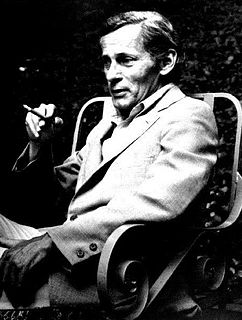A Quote by William Gaddis
He was doing missionary work. But from the outset he had little success in convincing his charges of their responsibility for a sin committed at the beginning of creation, one which, as they understood it, they were ready and capable (indeed, they carried charms to assure it) of duplicating themselves. He did no better convincing them that a man had died on a tree to save them all: an act which one old Indian, if Gwyon had translated correctly, regarded as "rank presumption".
Quote Topics
Act
Assure
Beginning
Better
Capable
Carried
Charges
Charms
Committed
Convincing
Correctly
Creation
Did
Died
Doing
Had
His
Indeed
Indian
Little
Man
Missionary
Missionary Work
Old
Outset
Presumption
Rank
Ready
Regarded
Responsibility
Save
Sin
Success
Them
Themselves
Translated
Tree
Understood
Were
Which
Work
Related Quotes
It had been startling and disappointing to me to find out that story books had been written by people, that books were not natural wonders, coming up of themselves like grass. Yet regardless of where they come from, I cannot remember a time when I was not in love with them - with the books themselves, cover and binding and the paper they were printed on, with their smell and their weight and with their possession in my arms, captured and carried off to myself. Still illiterate, I was ready for them, committed to all the reading I could give them.
Where was I?""A different island," said old Tallow. Her voice was stern, but there was an ache in her look that Omakayas had never before seen. "An island called Spirit Island where everyone but you died of the itching sickness- you were the toughest one, the littlest one, and you survived them all.""You were sent here so you could save the others," she said. "Because you'd had the sickness, you were strong enough to nurse them through it. They did a good thing when they took you in, and you saved them for their good act. Now the circle that began when I found you is complete.
Judge and prosecutor had hammered it home that Lady Chatterly was an immoral woman, that she had had sexual relations before marriage, that she had committed adultery under her husband's roof; as if these charges somehow disqualified her from participation in serious literature. Indeed, there were long periods of the trial during which an outsider might well have assumed that a divorce case was being heard.
The hidden so-called scholars of old did not hide themselves and refuse to be seen. They did not close the door on their words and refuse to let them out. They did not shut away their wisdom and refuse to share it. But those times were all haywire. If it had been possible for them to act, they could have done great things, bringing all to Oneness without any sign of doing so. However, the times were not favorable and it was not possible, so they put down deep roots, remained still and waited. this was the Tao by which they survived.
Unless a man has the talents to make something of himself, freedom is an irksome burden. We join a mass movement to escape from individual responsibility, or, in the words of an ardent young Nazi, to be free from freedom. It was not sheer hypocrisy when the rank-and-file Nazis declared themselves not guilty of all the enormities they had committed. They considered themselves cheated and maligned when made to shoulder responsibility for obeying orders. Had they not joined the Nazi movement in order to be free from responsibility?
Those who profess contempt for men, and put them on a level with beasts, yet wish to be admired and believed by men, and contradict themselves by their own feelings--their nature, which is stronger than all, convincing them of the greatness of man more forcibly than reason convinces them of his baseness.
There were times when it appeared to Dorian Gray that the whole of history was merely the record of his own life, not as he had lived it in act and circumstand, but as his imagination had created it for him, as it had been in his brain and in his passions. He felt that he had known them all, those strange terrible figures that had passed across the stage of the world and made sin so marvellous, and evil so full of subtlety. It seemed to him that in some mysterious way their lives had been his own.
I saw a very old man, literally eating his own human waste out of hunger. I went to the nearby hotel and asked them what was available. They had idli, which I bought and gave to the old man. Believe me, I had never seen a person eating so fast, ever. As he ate the food, his eyes were filled with tears. Those were the tears of happiness.
I had heard the old Indian legend about the red fern. How a little Indian boy and girl were lost in a blizzard and had frozen to death. In the spring, when they were found, a beautiful red fern had grown up between their two bodies. The story went on to say that only an angel could plant the seeds of a red fern, and that they never died; where one grew, that spot was sacred.
Apologys for self-evident Truths can never have any effect on those who have so little Sense as to deny them. They are the Foundation of all Reasoning, and the only just Bottom on which Men can proceed in convincing one another of the Truth: and by consequence whoever is capable of denying them, is not in a condition to be informed.
I didn't like what was on TV in terms of sitcoms?it had nothing to do with the color of them?I just didn't like any of them. I saw little kids, let's say 6 or 7 years old, white kids, black kids. And the way they were addressing the father or the mother, the writers had turned things around, so the little children were smarter than the parent or the caregiver. They were just not funny to me. I felt that it was manipulative and the audience was looking at something that had no responsibility to the family.
When Christ was about to leave the world, He made His will. His soul He committed to His father; His body He bequeathed to Joseph to be decently interred; His clothes fell to the soldiers; His mother He left to the care of John; but what should He leave to His poor disciples that had left all for Him? Silver and gold He had none; but He left them that which was infinitely better, His peace.
If we are made in some degree for others, yet in a greater are we made for ourselves. It were contrary to feeling and indeed ridiculous to suppose that a man had less rights in himself than one of his neighbors, or indeed all of them put together. This would be slavery, and not that liberty which the bill of rights has made inviolable, and for the preservation of which our government has been charged.
It didn't matter in the end how old they had been, or that they were girls, but only that we had loved them, and that they hadn't heard us calling, still do not hear us, up here in the tree house with our thinning hair and soft bellies, calling them out of those rooms where they went to be alone for all time, alone in suicide, which is deeper than death, and where we will never find the pieces to put them back together.
At school he had done things which had formerly seemed to him very horrid and made him feel disgusted with himself when he did them; but when later on he saw that such actions were done by people of good position and that they did not regard them as wrong, he was able not exactly to regard them as right, but to forget about them entirely or not be at all troubled at remembering them.







































